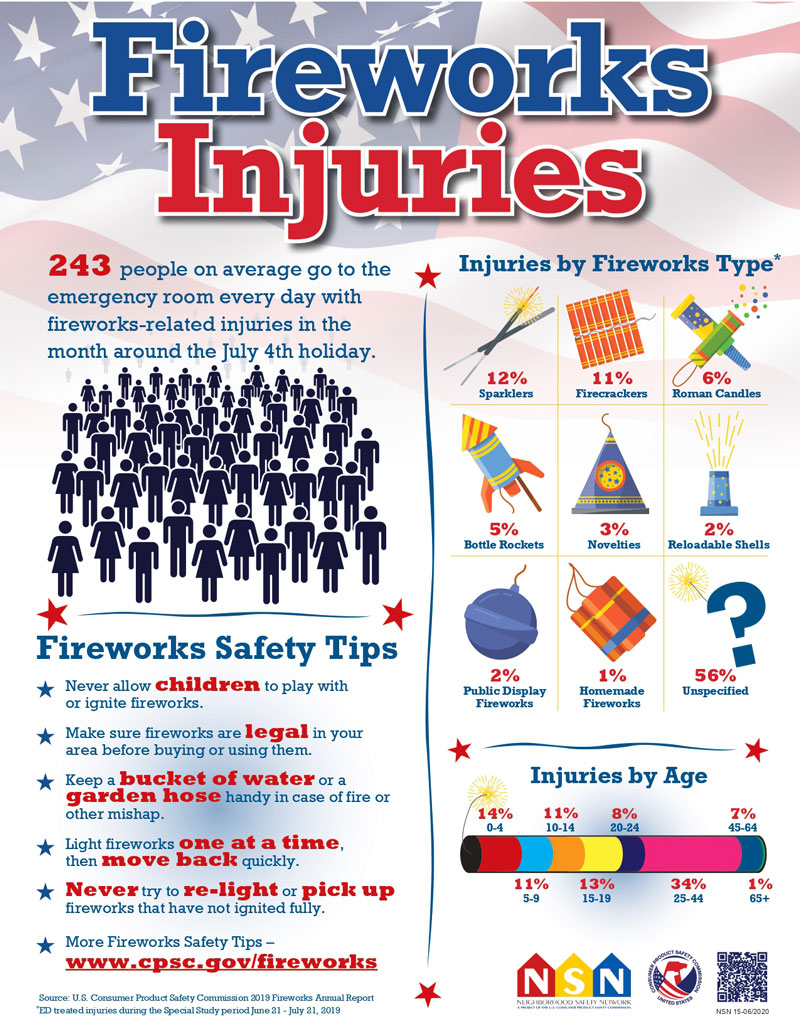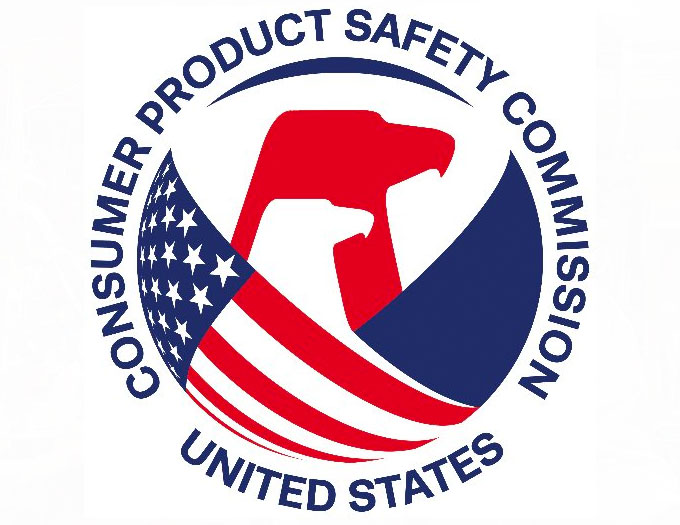
This year’s July 4th holiday may look different from most, with many people celebrating from home due to social distancing restrictions still in place to help stop the spread of COVID-19.
All too often, however, Independence Day backyard celebrations can end up with a trip to the hospital for fireworks-related injuries.
“Many Americans will not get to see the grand, professional fireworks displays this 4th of July given the cancellations of public celebrations and stay-at-home orders across the country,” explains U.S. Consumer Product Safety Commission (CPSC) Commissioner Dana Baiocco.
“As an alternative, people are purchasing their own fireworks in an effort to recreate that tradition at home.”
“The need for safety awareness regarding fireworks is greater than ever,” she said, “and anyone who plans to use consumer fireworks this year should review and follow CPSC’s simple safety tips to prevent injuries and incidents.”
As part of this year’s virtual fireworks safety initiatives, CPSC is working with Adam Savage, best known as the former co-host and producer of the Discovery Channel television hit “MythBusters.”
Adam is a science communicator, special effects designer, educator, television personality, author, and explosives expert (Adam is an honorary lifetime member of the International Association of Bomb technicians and investigators – IABTI).
(Adam Savage teamed up with CPSC to share some important firework safety tips to help keep you and your family safe while celebrating the 4th of July. Courtesy of U.S. Consumer Product Safety Commission and YouTube. Posted on Jun 25, 2020.)
Thank you to Adam for sharing his extensive experience on fireworks safety.
The U.S. Consumer Product Safety Commission (CPSC) wants consumers to know the risks of handling fireworks at home, and how to prevent serious injuries and deaths.
Tips to Celebrate Safely
-
Never allow young children to play with, or ignite, fireworks, including sparklers. Sparklers burn at temperatures of about 2,000 degrees Fahrenheit—hot enough to melt some metals.
-
Keep a bucket of water or a garden hose handy, in case of fire or other mishap.
-
Light fireworks one at a time, then move away quickly.
-
Never try to relight or handle malfunctioning fireworks. Soak them with water and throw them away.
-
Never place any part of your body directly over a fireworks device when lighting the fuse. Move to a safe distance immediately after lighting fireworks.
-
Never point or throw fireworks (including sparklers) at anyone.
-
After fireworks complete their burning, douse the spent device with plenty of water from a bucket or hose before discarding the device to prevent a trash fire.
-
Make sure fireworks are legal in your area, and only purchase fireworks that are labeled for consumer (not professional) use.
-
For more fireworks safety tips visit www.cpsc.gov/fireworks.
The Data on Injuries and Deaths
Today, CPSC announced that about 10,000 injuries and 12 fireworks-related deaths were reported for 2019.

There were an estimated 10,000 fireworks-related, emergency department-treated injuries in 2019, with 73 percent occurring during the month surrounding the Fourth of July (June 21-July 21).
During that period, sparklers were the number one cause of injuries, accounting for an estimated 900 injuries; 66 percent of the injuries were to males.
Similar to 2018’s data, nearly half of the estimated injuries were to individuals younger than 20 years of age.
In fact, half of reported sparkler injuries involved children younger than 5.
At least 12 people died from fireworks-related incidents in 2019.
Several deaths occurred when victims held and ignited fireworks.

In one of the reported cases in 2019, a 21-year-old male was critically injured when lighting mortar-type fireworks on the rooftop of an apartment complex.
The firework ignited and exploded while the victim was holding it over his head.
The victim was taken to the hospital, where he died five days later.
(See the following demonstrations of Sparklers, Bottle Rockets, M-80s, Quick Match Fuse, M-1000, Aerial Device #1, Home Device Manufacture, and Aerial Device #2 to see how 12 people were killed and an estimated 10,000 were sent to the ER in 2019. Courtesy of the U.S. Consumer Product Safety Commission and YouTube. Posted on Jun 25, 2020.)
CPSC has reports of 126 fireworks-related deaths between 2004 and 2019.
The U.S. Consumer Product Safety Commission (CPSC) is charged with protecting the public from unreasonable risks of injury or death associated with the use of thousands of types of consumer products.
Deaths, injuries, and property damage from consumer product incidents cost the nation more than $1 trillion annually.
 CPSC’s work to ensure the safety of consumer products has contributed to a decline in the rate of deaths and injuries associated with consumer products over the past 40 years.
CPSC’s work to ensure the safety of consumer products has contributed to a decline in the rate of deaths and injuries associated with consumer products over the past 40 years.
Federal law bars any person from selling products subject to a publicly announced voluntary recall by a manufacturer or a mandatory recall ordered by the Commission.
For More Lifesaving Information, please visit CPSC.gov.
-
Please Report a dangerous product or a product-related injury on www.SaferProducts.gov.
-
Call CPSC’s Hotline at 800-638-2772 (TTY 301-595-7054).
-
Contact a media specialist.
AST strives to meet a 3 STAR trustworthiness rating, based on the following criteria:
- Provides named sources
- Reported by more than one notable outlet
- Includes supporting video, direct statements, or photos

















